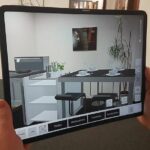Patients in the East of England can now use immersive technology to help overcome mental health conditions. Gill Hitchcock finds out more.
Virtual reality has the potential to increase access to treatment for a range of conditions. There is no shortage of research demonstrating this, covering post-traumatic stress disorder, Parkinson’s, stroke, autism and more. But this year, Norfolk and Suffolk became one of the first NHS trusts to integrate VR into its psychological care pathways.
Using off-the-shelf VR headsets and specially created virtual worlds, the trust has been offering virtual treatment to patients struggling with disabling phobias. By gradually increasing patients’ exposure to situations they would usually avoid, the trust says it is helping them to manage their feelings in a safe and controlled environment.
Previously, there were practical difficulties in coaching patients through situations which were troubling them. Nesta Reeve, a consultant clinical psychologist and lead for wellbeing services at the trust, explains: “When you follow National Institute for Health and Care Excellence guidelines for the treatment of phobias, you tend to immerse people into the specific situation in real life.
“That is difficult for a therapy service because we are office-based, we tend to see people one after another and so we don’t really have the time to go out. Also, people who were successfully treated for phobias were having a lot of sessions in Improving Access to Psychological Therapies (IAPT) services.”
Automated treatment with VR, however, offers significant solutions. It means that patients do not have to leave the clinic, nor it is necessary for a clinician to be present.
“I think this is a great opportunity to use technology to help people get greater exposure to their fears and to overcome them without having to leave the clinic,” says Reeve. “It means we can treat people more quickly, and hopefully we will get more people coming forward with fears that might seem minor, but which are stopping them from doing something important.
“Fears of MRI scans and injections are good reasons for doing the exposure. But there are also people who are blocked in their careers for fear of public speaking, sitting exams or going into lecture theatres. This can help people to move their lives on.”
The catalyst for Norfolk and Suffolk’s innovation came when the East of England clinical network for IAPT put out a challenge for clinicians to find new digital ways of working.
With financial backing of £10,000 from the network, in mid-2019 Joe Embrey, a cognitive behavioural therapist at the trust, began testing VR to treat people with a fear of needles and agoraphobia.
“The trial showed that VR is a really effective at bridging the gap between real-life exposure and what the patient feels able to do at the time they enter treatment,” says Embrey. “It has been especially useful for things like needle phobias, because the process of preparing for and giving an injection is not something which we can easily replicate in the therapy room.”
Software challenges
Buying VR headsets was easy for the trust. Finding the right software was difficult. Reeve’s search failed to identify a UK supplier, but found a VR platform for psychology and mental health from Spanish company Psious. Its product includes fears of injections, scans, social situations, darkness, animals and agoraphobia.
Norfolk and Suffolk pays Psious €1,000 per licence. Although the licence can only be used with one patient at a time, the number of patients and times it can be used is unlimited.
“I know that Psious is used by private clinicians in the US and UK, but when I was in contact with company recently, I asked them if any other NHS trust was using their VR and they said that at the moment, no, we are the first,” says Reeve.
“But they are getting involved with the NHS in Manchester and they are keen to learn from our experience because there were a few blocks to implementing this. Not least, in the NHS it is quite hard to buy something bespoke. Buying something from Spain in euros was a little challenging too.”
Research at University of Oxford’s department of psychiatry into immersive VR to treat fear of heights, found patients were willing to go into situations that troubled them and to try new ways of responding. They were willing because they knew it was a simulation. But what the patients learned through VR, was transferred to the real world.
In Norfolk and Suffolk’s experience, patients are usually more willing to try VR than face a real-life situation. They can control and even stop the experience if they wish. And the system also enables them to monitor their anxiety and to know how their anxiety has reduced over time.
The Covid-19 crisis means that all the trust’s psychology consultations are taking place via phone or video. For the time being, the VR treatment is on hold. But when clinics are cancelled, staff are encouraged to use the time available to familiarise themselves with the VR system.
“Phobias can have a real negative impact on people’s lives,” says Reeve. “Now we have this technology, we hope that more people will come forward to ask for help with their phobias, and that VR will help them to get better more quickly so that they can enjoy activities which many of us take for granted.”
Quelle:Foto: Credit: Jazna Rossi/Pixabay
https://www.vrroom.buzz/vr-news/trends/how-nhs-trust-using-vr-treat-phobias



